Summary
Exploring top Odoo alternatives for business management is a common approach, especially when looking for a tool better suited to specific needs.
Whether due to budget constraints, implementation complexity, or an increased need for customisation, the goal is to find a solution that aligns with your company's expectations and structure.
Odoo is valued for its flexibility and adaptability but can prove complex for SMEs seeking simplicity and accessibility. This article will guide you through the main Odoo alternatives, highlighting their advantages and disadvantages to help you select the most suitable management software for your needs.
It is essential to define your business management requirements, whether they involve CRM, project management, inventory management, or data analysis. We will discuss the key features to consider and present the best available solutions, making it easier for you to choose from Odoo alternatives.
Table: Best Odoo Alternatives
| Software Name | Description |
|---|---|
| Oracle NetSuite | Cloud ERP for medium and large businesses |
| SAP Business One | ERP for SMEs, integrating accounting, sales management, production, and customer relations |
| Microsoft Dynamics 365 | Integrated solution for financial management, CRM, and supply chain management |
| BoondManager | ERP for service-based companies |
| Sage | ERP focused on accounting, production, inventory, and financial analysis |
| ERPNext | Open-source ERP covering finance, HR, project management, and suitable for various industries |
| Dolibarr | Modern open-source ERP for CRM management, invoicing, inventory, and marketing campaigns |
| Divalto | ERP for SMEs, integrating financial management, production, and CRM |
| Sylob | ERP dedicated to the industrial sector, offering inventory management, planning, orders, and deliveries |
| Axelor | Flexible open-source ERP with financial management, HR, projects, and advanced reporting |
First, identify your key needs (CRM, ERP, inventory management, etc.) and constraints (budget, ease of integration, scalability) to make the best choice.
10 Odoo Alternatives (Alternative ERPs)
1. Oracle NetSuite
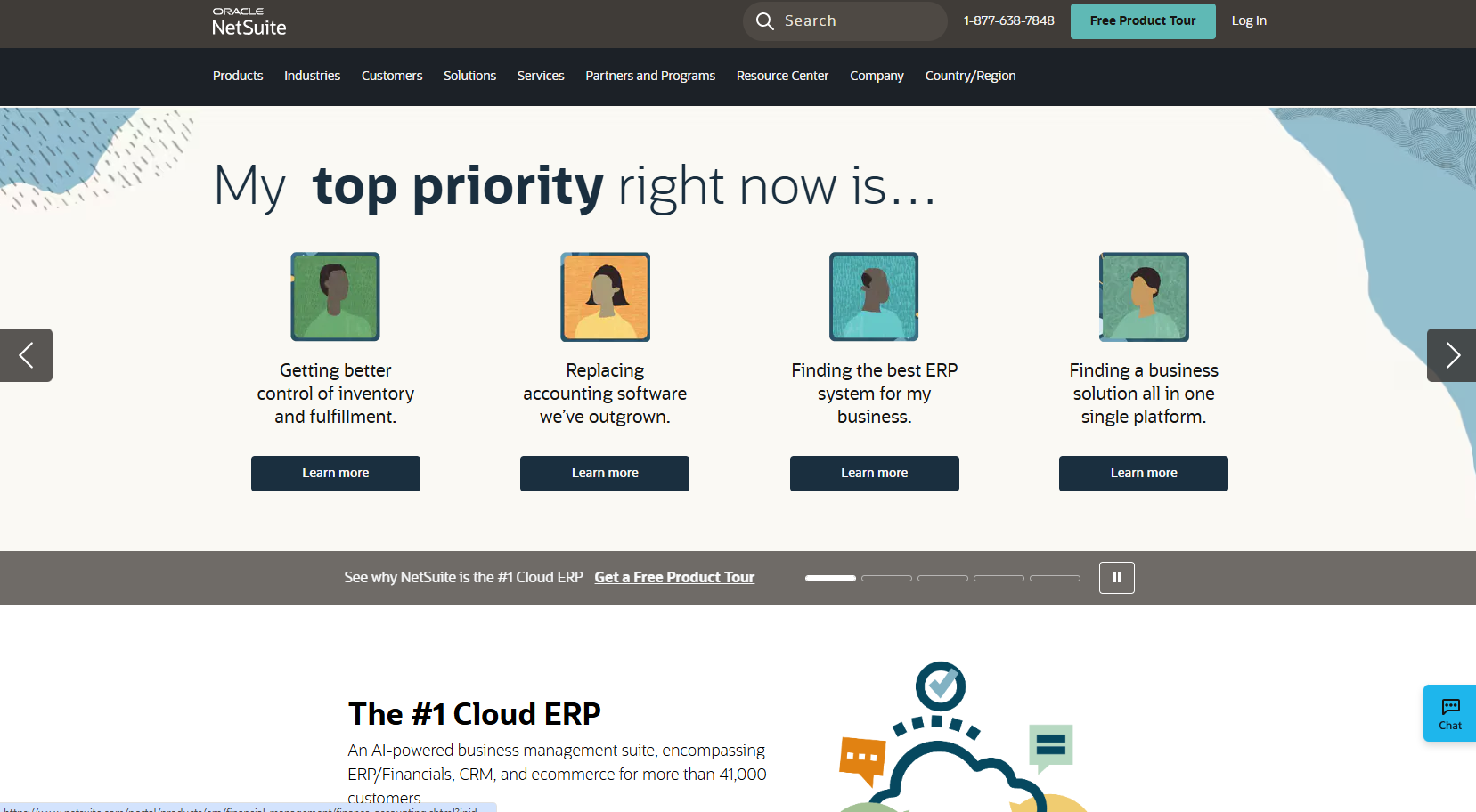
Oracle NetSuite is a comprehensive cloud-based ERP solution designed to meet the needs of medium and large businesses, with a massive customer base across more than 200 countries.
It offers a wide range of applications covering financial management, human resources, marketing automation, and omnichannel commerce.
NetSuite stands out for its advanced features in production management, logistics, customer relations, and its analytics and reporting tools that enhance business intelligence.
2. SAP Business One
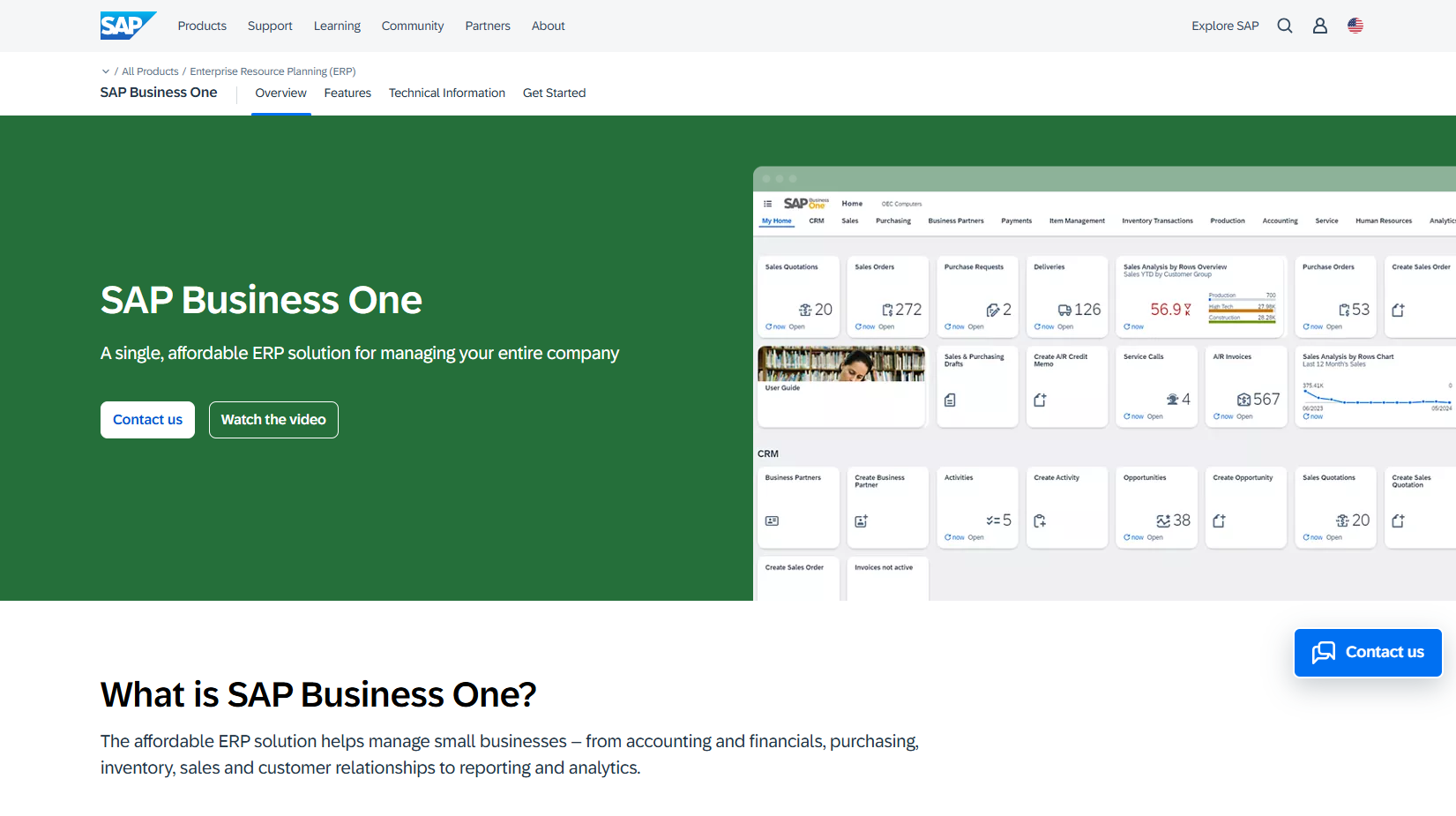
SAP Business One is an ERP specifically designed for small and medium-sized enterprises (SMEs) as well as subsidiaries of large corporations.
It ensures full integration of business processes, from accounting and financial reporting to procurement, production, sales, and customer relations.
Available as both a cloud or on-premise deployment, SAP Business One can also be integrated with SAP HANA and Microsoft 365.
3. Microsoft Dynamics 365
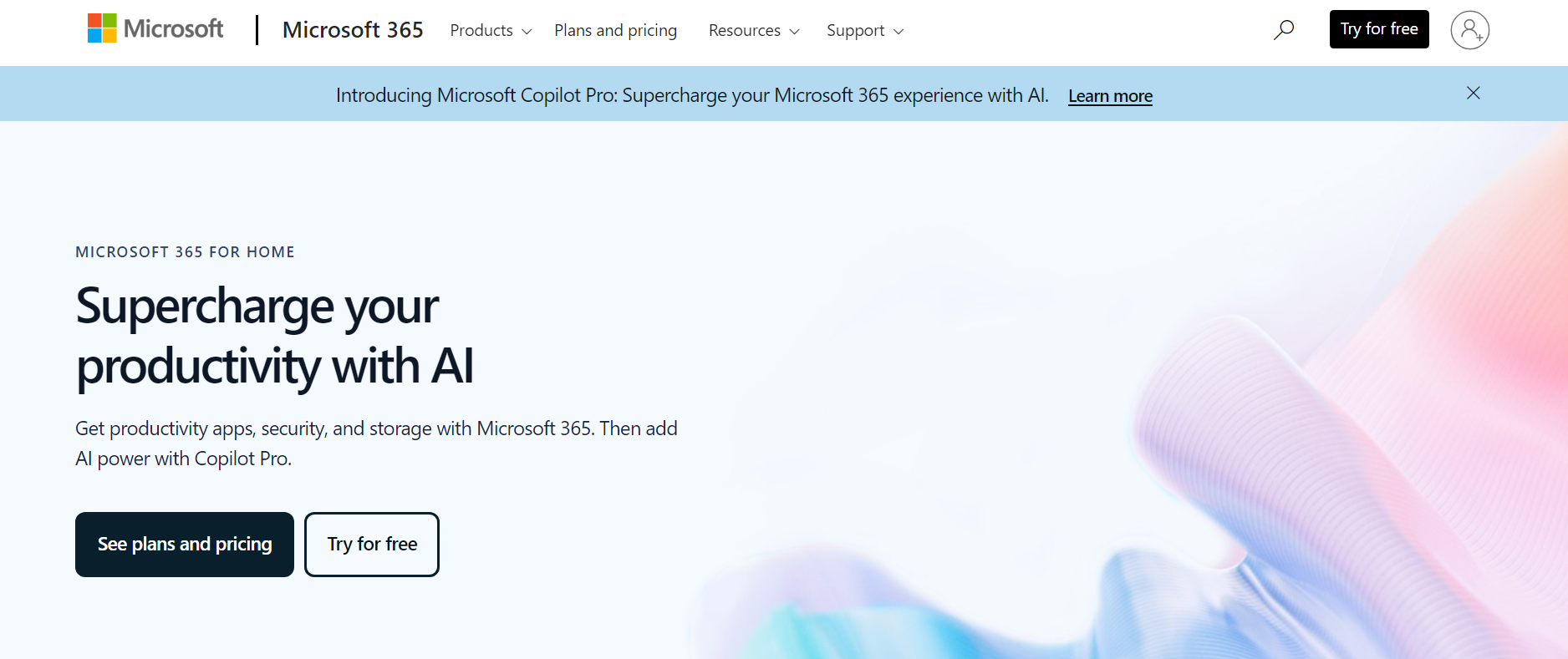
Microsoft Dynamics 365 Business Central offers a comprehensive business management solution, merging financial management, supply chains, invoicing, analytics, and customer relationship management.
As the successor to Microsoft Dynamics NAV, this modernised solution allows unlimited scalability in terms of the number of users and seamlessly integrates with other Microsoft applications as well as third-party add-ons.
4. BoondManager
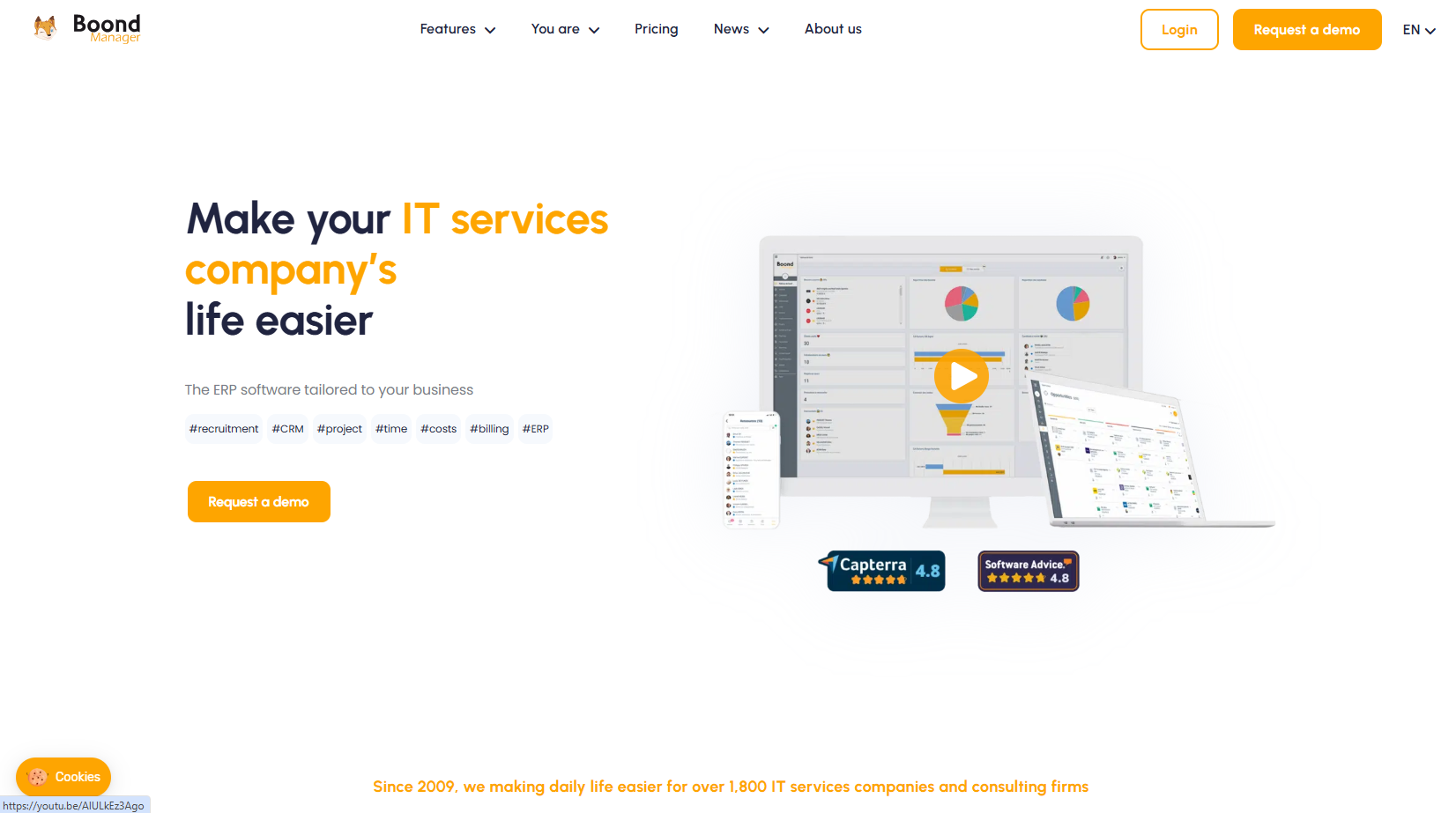
BoondManager is an ERP software designed to meet the needs of service-based companies, particularly in consulting, engineering, and IT services firms (ESNs – Digital Service Companies).
This tool centralises and optimises management of key activities via software, including sales management, project tracking, resource planning, invoicing, and reporting.
Its modular platform adapts to industry-specific requirements to enhance productivity and promote better team coordination.
Accessible in SaaS mode, BoondManager also offers collaborative features and integrations with other tools to simplify operational processes.
5. Sage
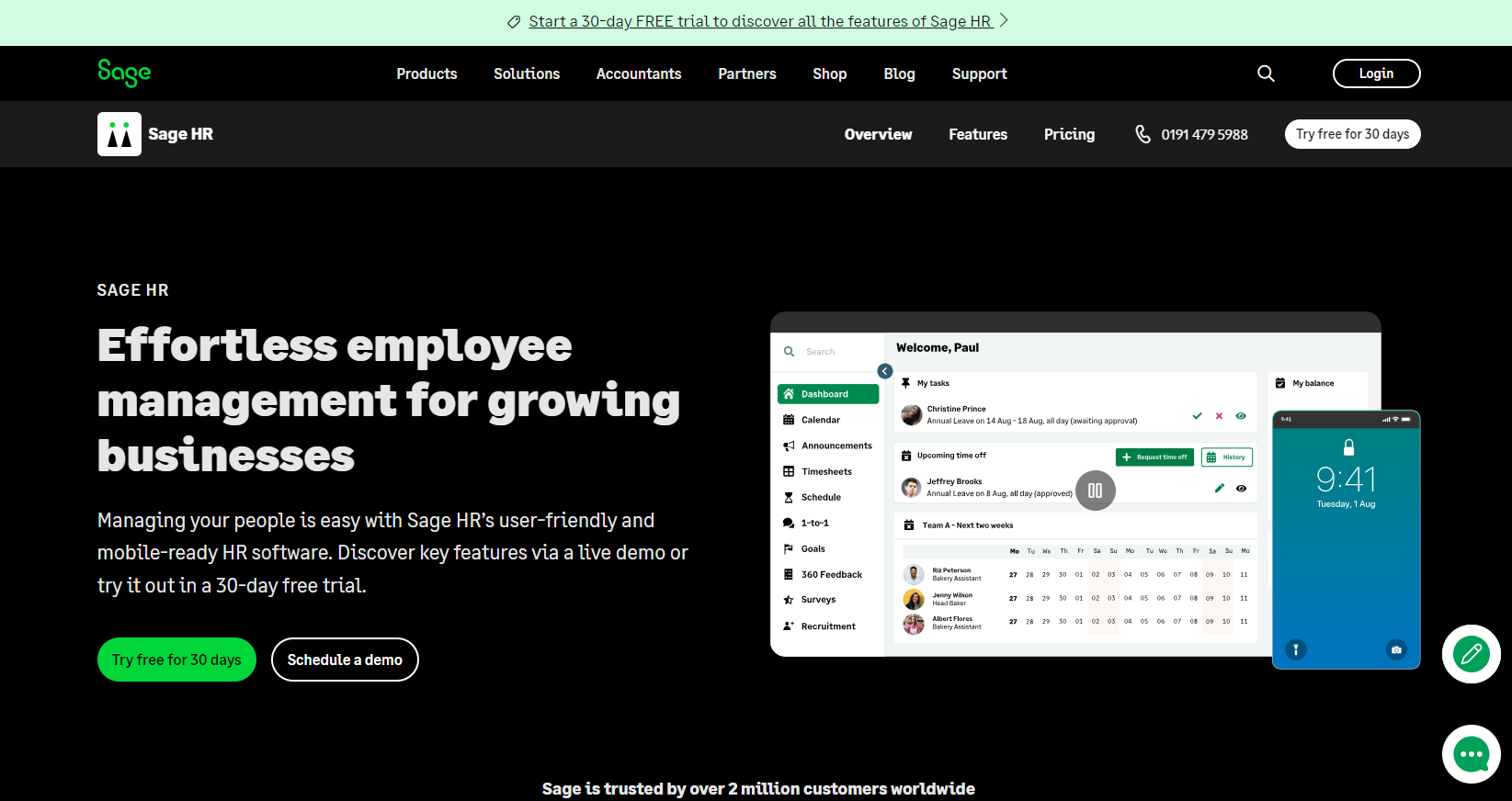
Sage X3, including its Sage Intacct version, is an ERP solution focused on financial management, accounting, and planning. It is ideal for mid-sized businesses, offering features to enhance production, inventory management, and logistics.
Sage is particularly valued for its advanced reporting and financial analysis tools.
6. ERPNext
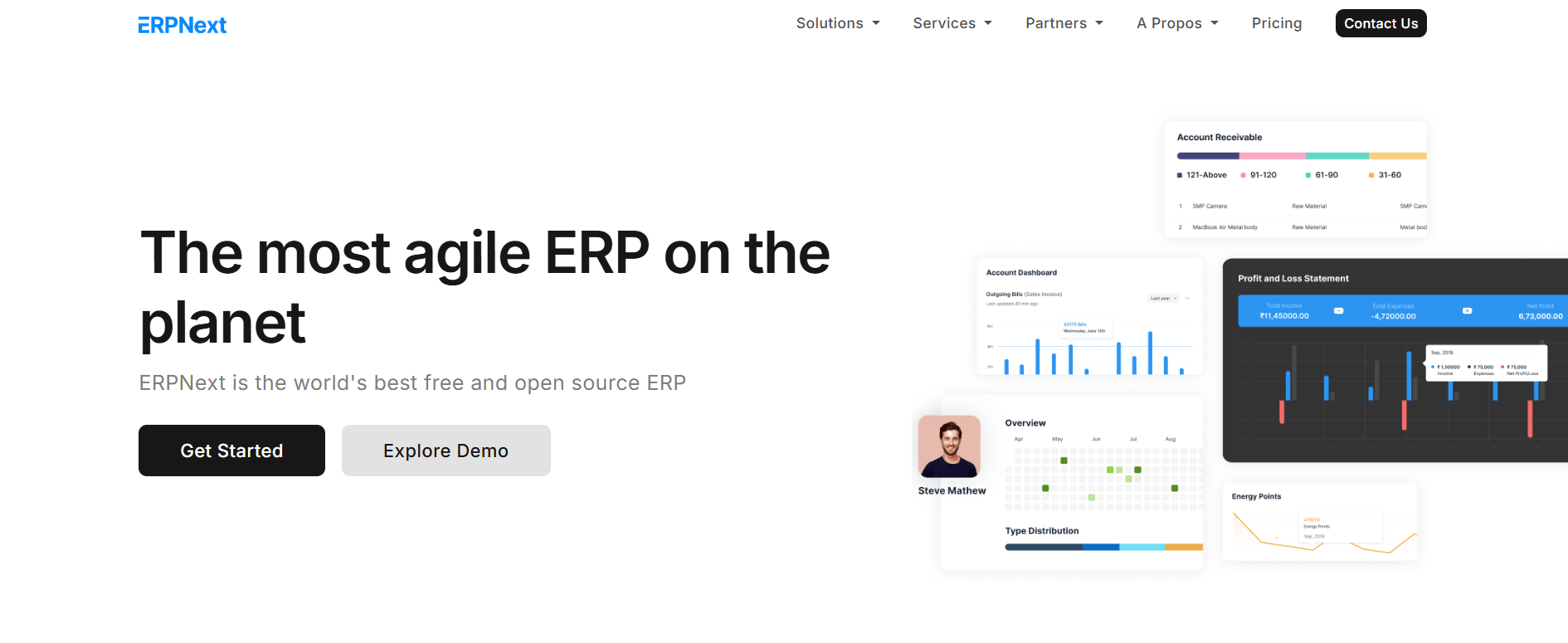
ERPNext is a comprehensive open-source ERP solution covering a wide range of functionalities, from financial management and human resources to inventory and project management.
Suitable for businesses of all sizes, it stands out for being free and customisable for various industries such as services, retail, and healthcare.
ERPNext offers customisable dashboards, lead management, sales and marketing campaigns, and efficient tools for supply chain management.
7. Dolibarr
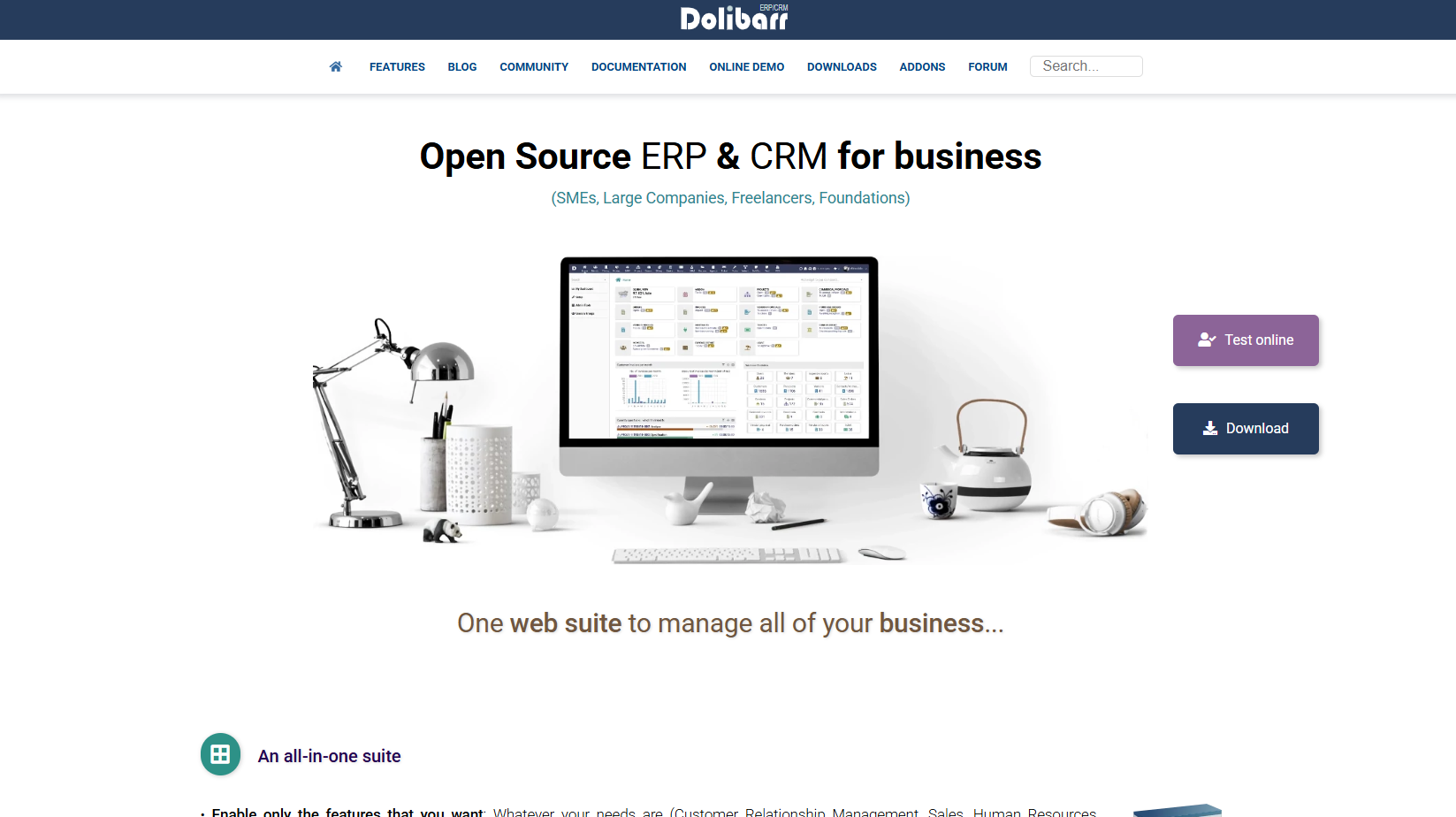
Dolibarr is an open-source ERP and CRM software known for its modernity and ease of use. It allows the management of customers, invoices, orders, products, inventory, schedules, email campaigns, and shipments.
Compatible with Windows, Mac, Linux, and Android, Dolibarr is particularly suited for small and medium-sized businesses due to its high flexibility.
8.Divalto
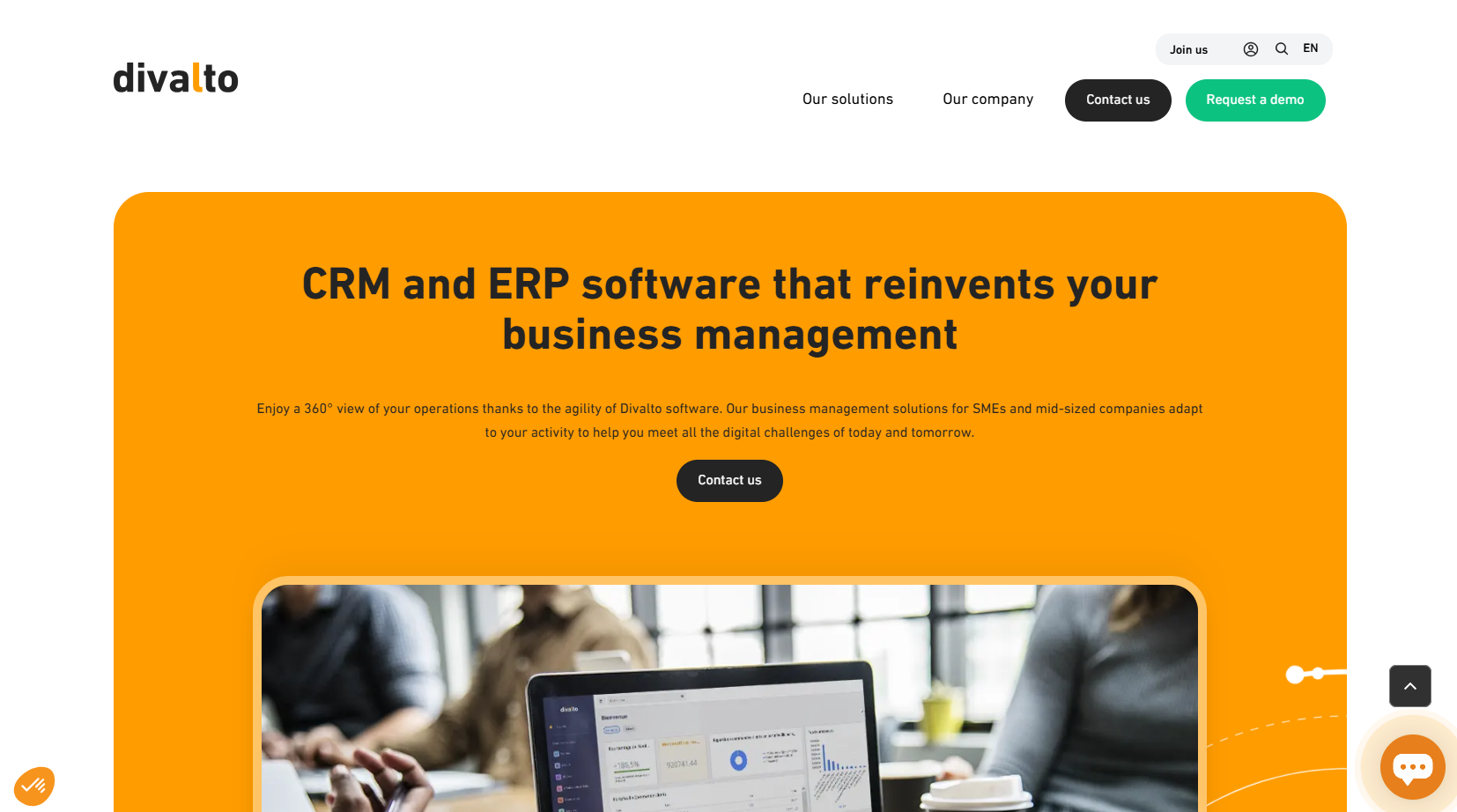
Divalto is a French ERP solution focused on integrated business management, covering financial management, inventory, production, and customer relations. Designed for SMEs and mid-sized companies, it aims to optimise operational processes and improve efficiency.
9. Sylob
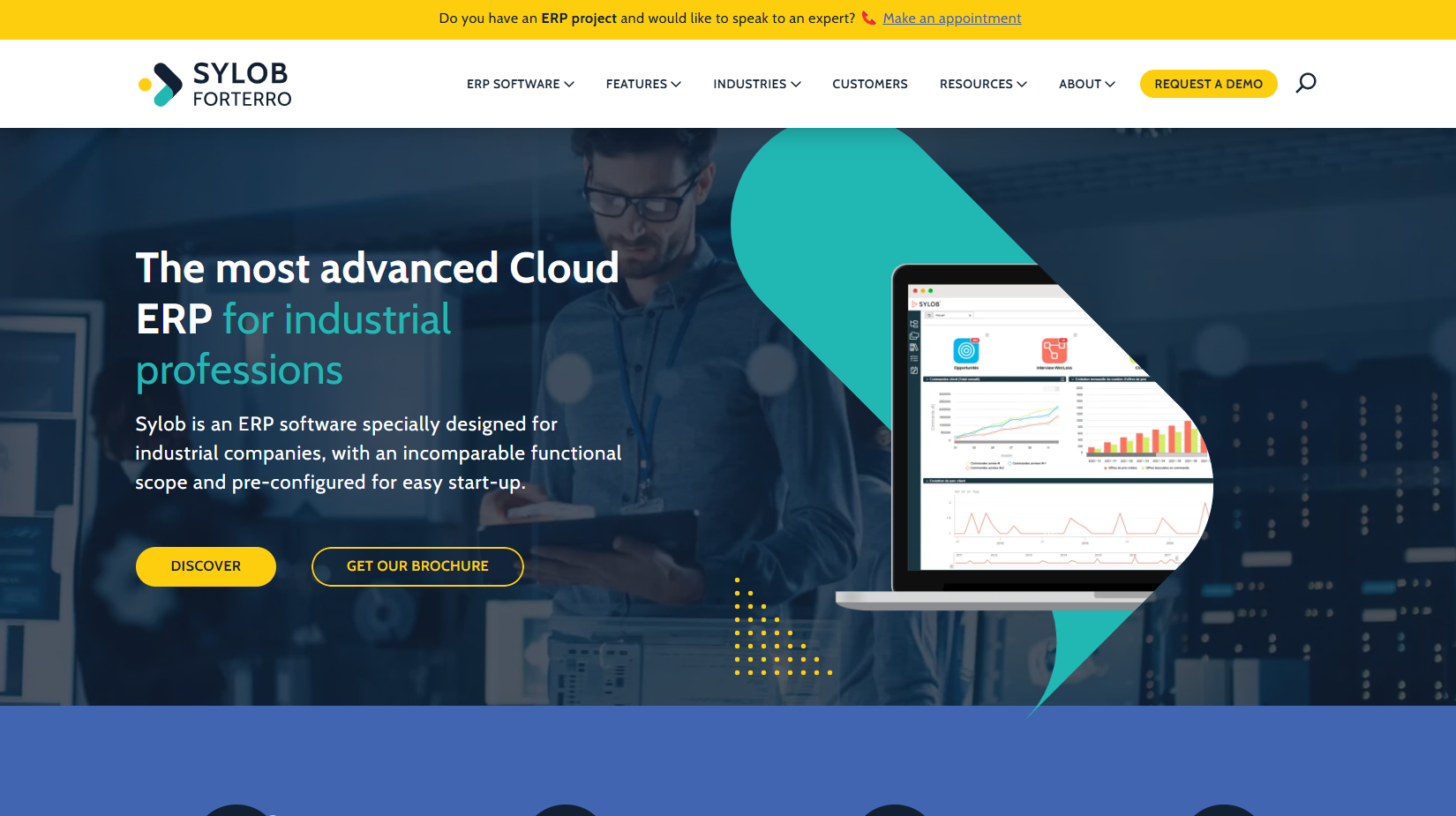
Sylob offers an ERP solution dedicated to industrial sector businesses, with specific features for inventory management, production planning, and order and delivery management. This solution is ideal for companies looking to refine their supply chain and production management.
10. Axelor
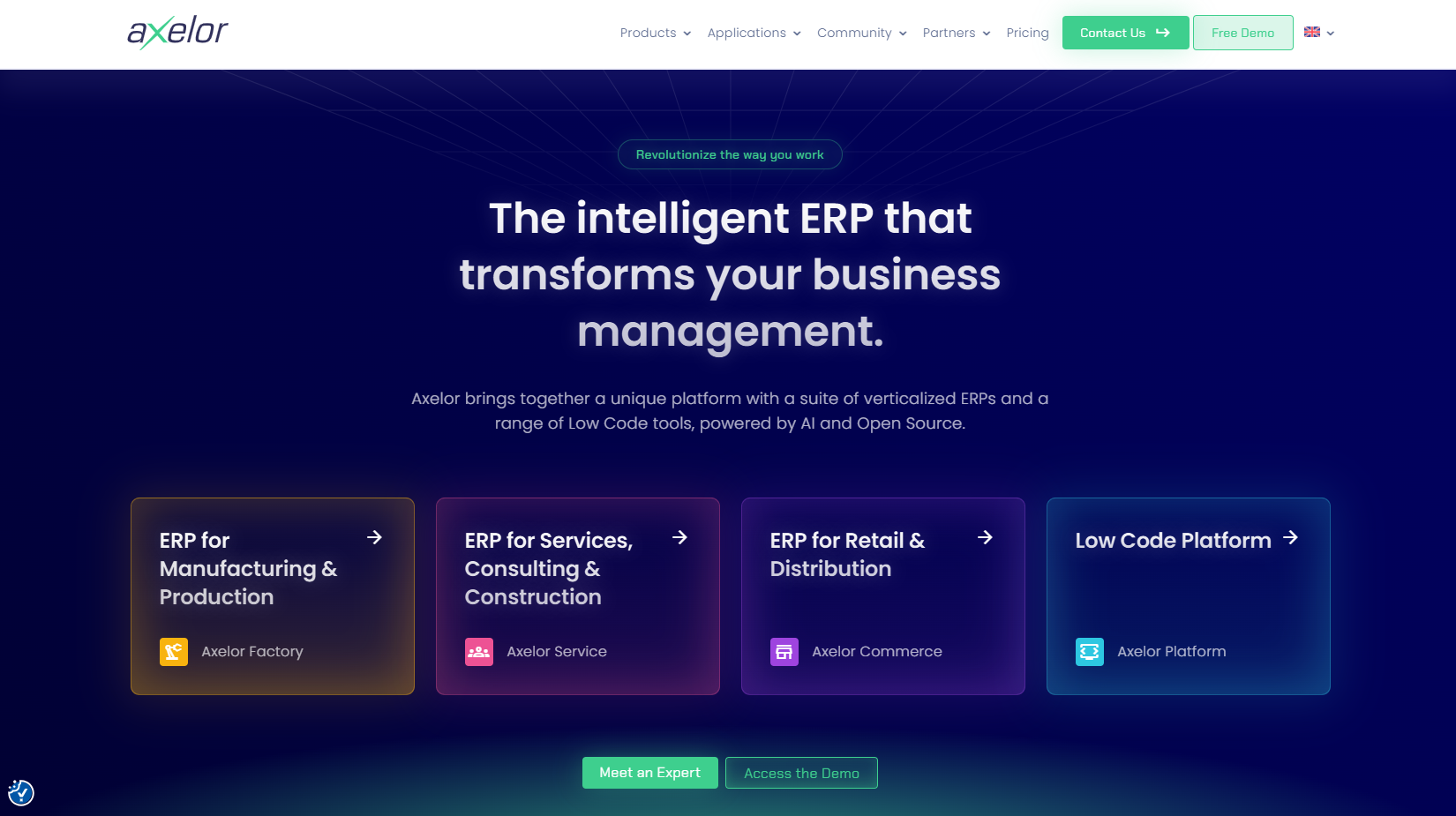
Axelor is a comprehensive open-source ERP platform equipped with a wide range of essential business management features.
This includes financial management, human resources management, inventory tracking, and project management. It stands out for its flexibility and ability to be customised, precisely meeting the unique requirements of each business.
Axelor also differentiates itself with its intuitive user interface and advanced reporting tools, making decision-making and process optimisation easier.
What Are the Key Features to Consider When Choosing an Alternative to Odoo?
When searching for an alternative to Odoo, it is essential to evaluate certain key features to ensure the selected solution aligns with your company's unique requirements. Let's examine the fundamental aspects to consider:
Core Features
An effective alternative to an ERP or CRM like Odoo should offer essential functionalities, including financial management, inventory management, human resources management, and project management. These modules should be seamlessly integrated to provide a global and coherent view of business activities.
Integration with Other Applications
Seamless integration with other software and platforms used within your company is crucial. Choose a solution that can easily connect to e-commerce applications, payment systems, messaging services, and other essential business management tools.
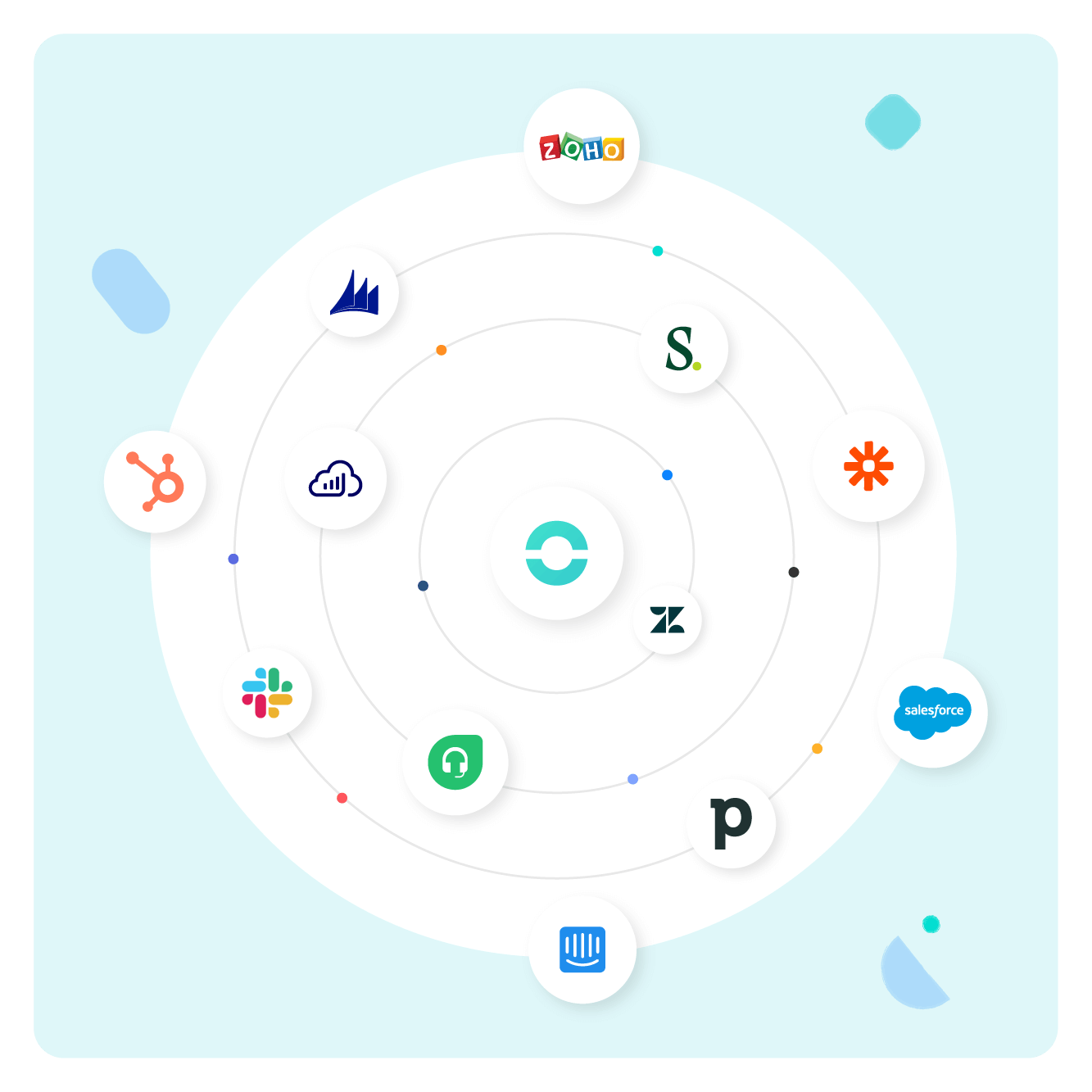
Customisation and Flexibility
The specific needs of each company make solution customisation essential.
A good alternative to Odoo should offer flexible customisation options that align with your company's unique processes.
Usability and User Interface
The interface must be intuitive and easy to use, even for users without technical skills. Customisable dashboards, drag-and-drop interfaces, and smooth navigation are important criteria to consider.
Analytics and Reporting
Advanced analytics and reporting features are essential for informed decision-making. The chosen solution should offer real-time reporting capabilities, interactive dashboards, and data analysis tools to enhance business intelligence.
Customer Support and Training
Effective customer support and training resources are crucial for a successful implementation of the solution. Look for an alternative that provides reliable support, tutorials, and training programs to ease software adoption.
Scalability and Deployment Options
The solution must be able to adapt to your company's growth. Prioritise solutions offering flexible scalability, without strict limits on the number of users, and deployment options in the cloud or on-premise.
By considering these features, you will be able to choose an alternative to Odoo that precisely meets your company's needs and helps optimise your operations.
Odoo Alternatives: Key Takeaways
In summary, choosing an alternative to Odoo should be guided by specific criteria such as your company's unique needs, implementation complexity, costs involved, and integration capabilities with other systems. Options like NetSuite, Microsoft Dynamics 365, SAP Business One, and ERPNext offer a range of advanced features and distinct benefits suited to the varied needs of SMEs and large enterprises.
It is essential to consider ease of use, customization options, and associated costs for each option.
Open-source software like ERPNext and Dolibarr is particularly attractive for companies looking for cost-effective and modular solutions.
To improve the efficiency of your operations, it is advisable to carefully compare these alternatives based on your requirements.
Exploring demos or free trial versions is an excellent way to discover the features offered by each software before making a final choice. By selecting the most suitable solution, you position your business for improved productivity and sustained growth.
To enhance connectivity and interoperability between your business tools, Ringover provides its API and webhooks. These tools facilitate integration with ERP, CRM, or other essential management platforms.
With these features, you can synchronise your data, automate workflows, and create custom connections to meet your company's specific needs. This way, Ringover seamlessly integrates into an existing software ecosystem, simplifying business management while optimising productivity.
Odoo Alternatives FAQ
What is Odoo, and why look for alternatives?
Odoo is an open-source ERP (Enterprise Resource Planning) software used to manage various aspects of a business, such as e-commerce, invoicing, accounting, inventory management, and project management. However, some companies may seek alternatives due to specific needs, functional limitations, or preferences in terms of user interface and cost.
What are the key features to consider when choosing an alternative to Odoo?
Key features to consider include:
- Project management
- Accounting and invoicing
- Inventory and supply chain management
- Marketing automation
- Customer support and ticketing
- Human resources management
- Integration with other tools and applications
Who are Odoo's main competitors?
Odoo, known for its comprehensive ERP and CRM offering, competes with several players in the market. These competitors provide similar or alternative functionalities tailored to different business needs. Here are the main competitors of Odoo:
- NetSuite: A comprehensive cloud ERP solution covering financial management, customer relations, e-commerce, order management, and human resources. Targeted at startups and SMEs, NetSuite stands out with its subscription-based pricing and industry-specific modules.
- Microsoft Dynamics 365: An advanced ERP and CRM solution that integrates seamlessly with the Microsoft ecosystem. It is ideal for businesses already using Microsoft tools and looking for an integrated solution to optimise operations.
- SAP Business One: Specifically designed for SMEs, this ERP solution provides industry-specific features and professional support. Although initial and operational costs are higher, SAP Business One offers considerable benefits to companies that fully leverage its capabilities.
Is Odoo free?
Odoo's pricing structure can be confusing due to its flexibility, raising questions about its cost. It is important to distinguish between Odoo Community and Odoo Enterprise, the two main versions of Odoo.
- Odoo Community: A completely free and open-source version, ideal for businesses looking for a management solution without upfront costs. It offers a range of applications for essential functions such as sales management, purchasing, and inventory—without requiring a subscription or licensing fees.
- Odoo Enterprise: The paid version of Odoo. Although it is not entirely free, it provides free access to one application of choice, allowing companies to explore some premium features without immediate costs. However, adding additional modules or expanding usage beyond one application incurs extra costs, requiring a subscription for each additional user and module.
What are the best alternatives to Odoo for SMEs?
When looking for Odoo alternatives for SMEs, it is crucial to consider functionality, accessibility, and cost. Here are some notable options covering CRM (Customer Relationship Management) or ERP (Enterprise Resource Planning) needs:
- HubSpot: An all-in-one CRM and marketing platform, ideal for SMEs. It includes tools for lead management, marketing campaigns, sales, and customer service. HubSpot stands out for its fully free version and intuitive user interface.
- Salesforce Sales Cloud: A specialised CRM solution offering advanced tools for sales and customer relationship management. Although more complex and potentially expensive, it is highly customisable and robust for growing SMEs.
- Dolibarr: A modern and user-friendly open-source ERP and CRM software. It provides integrated management of clients, invoices, orders, products, stocks, calendar, and communications. Compatible with various platforms, Dolibarr is particularly suited for SMEs thanks to its great flexibility and very competitive usage costs.
- Bitrix24: A collaborative platform with integrated CRM and project management. It offers team communication tools, task and time management, and document storage features. Bitrix24 is appreciated for its modern and user-friendly interface and its good value for money.
- Karlia: A French all-in-one CRM centralising commercial management, invoicing, and customer support. Features include email synchronisation, sales pipeline tracking, quotes with tracking and e-signature, and a ticketing module for customer support. Karlia is easy to use and offers excellent customer support.
- Zoho: A complete suite of over 40 applications, including CRM, accounting, human resources, customer support, and marketing automation. Its unique pricing model for unlimited access to all applications makes it economical and flexible for SMEs.
What are the best alternatives to Odoo for large enterprises?
For large enterprises, robust alternatives include:
- NetSuite: A comprehensive cloud ERP platform suitable for growing businesses, offering advanced financial management and supply chain features.
- SAP Business One: An ERP system designed for SMEs and large enterprises, with industry-specific functions for manufacturing and services.
- Epicor Kinetic: An ERP solution for manufacturing, distribution, and retail sectors, ideal for managing complex workflows.
What is the difference between open-source and proprietary alternatives?
Open-source alternatives, like ERPNext and SuiteCRM, are free and customisable but may require more technical expertise for customisation.
Proprietary alternatives, like Zoho One and NetSuite, often offer more intuitive interfaces and stronger customer support but can be more expensive.
How to choose the right alternative to Odoo for my business?
Consider the following:
- Features: Ensure the tool covers all your operational needs.
- Ease of use: Choose an intuitive user interface for easy adoption.
- Cost: Evaluate the price-performance ratio and pricing models (per user, per application, etc.).
- Integrations: Check for compatibility with your existing tools and applications.
How to migrate from Odoo to another ERP solution?
A migration involves several steps:
- Assess needs: Identify essential features for your business.
- Select the tool: Choose the best alternative.
- Data migration: Transfer data from Odoo to the new solution using migration tools or with the help of a partner.
- Training and support: Ensure your teams are trained and have access to good customer support.





